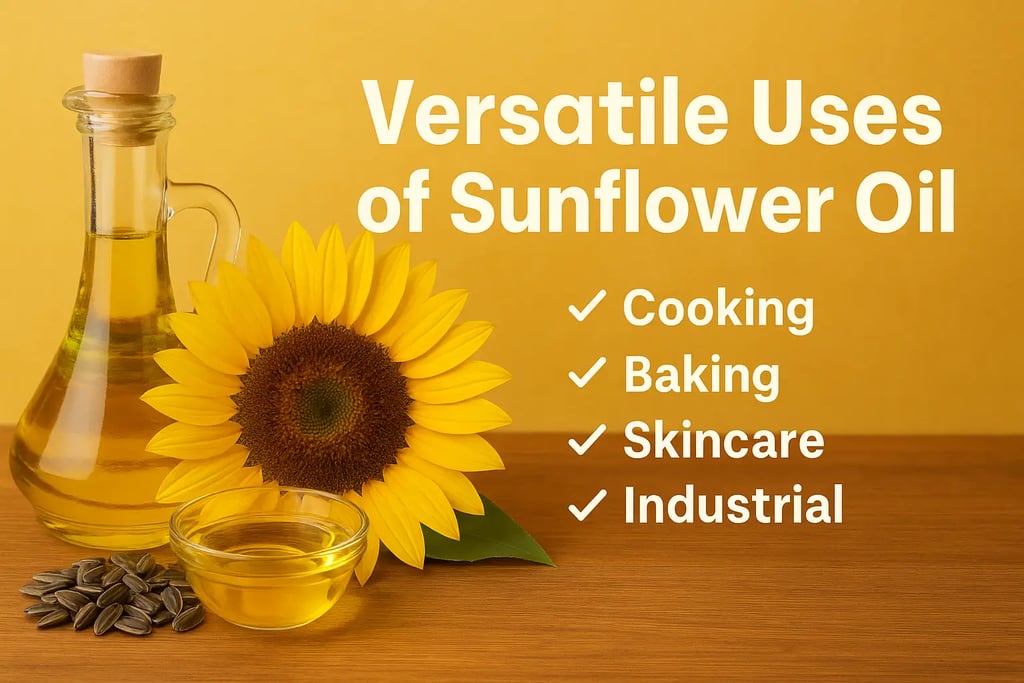Versatile Uses and Health Benefits of Sunflower Oil – Cooking, Skincare & More
Discover the diverse uses of sunflower oil for cooking, baking, skincare, and even industrial purposes. Learn its nutritional benefits, side effects, and how to use it safely for a healthy lifestyle.


🌻 Versatile Uses and Benefits of Sunflower Oil
Sunflower oil is one of the most versatile and widely used oils in both culinary and non-culinary applications. Extracted from the seeds of the sunflower plant (Helianthus annuus), this light and mild-tasting oil is known for its high smoke point, rich vitamin E content, and heart-friendly fats. Whether used in cooking, skincare, or industrial applications, sunflower oil offers an impressive range of benefits that make it a staple in households and industries worldwide.
🥘 Culinary Uses of Sunflower Oil
1. Ideal for High-Heat Cooking and Frying
One of the primary reasons sunflower oil is so popular in the kitchen is its high smoke point—around 450°F (232°C). This makes it perfect for deep-frying, stir-frying, and sautéing without breaking down into harmful compounds. Its neutral flavor ensures that it doesn’t alter the taste of your dishes, making it a go-to option for everyday cooking.
2. Perfect for Baking
In baking, sunflower oil’s light texture and subtle taste make it an excellent alternative to butter or other oils. It helps create moist, fluffy cakes, muffins, and biscuits without overpowering other flavors. Its consistency blends seamlessly with ingredients, ensuring a smooth batter and desirable texture.
3. Great for Salad Dressings and Marinades
Sunflower oil serves as a wonderful base for salad dressings and marinades. It provides a silky, smooth texture to dressings and helps emulsify other components such as vinegar or lemon juice. In marinades, it enhances the absorption of herbs and spices while tenderizing meat and vegetables naturally.
💆♀️ Sunflower Oil for Skin and Hair Care
Sunflower oil isn’t limited to cooking—it’s also a powerful natural skincare ingredient. Its non-comedogenic nature means it won’t clog pores, making it suitable for all skin types, including oily and acne-prone skin.
Moisturizing and Nourishing: Rich in vitamin E, sunflower oil helps lock in moisture and prevent dryness. It’s commonly used in moisturizers, lotions, and body oils.
Anti-Aging and Sun Protection: The antioxidant properties of vitamin E help protect skin from UV damage and premature aging. It’s often a key ingredient in anti-aging creams and sunscreens.
Gentle Makeup Remover: Sunflower oil effectively dissolves makeup and impurities without irritating the skin, making it a natural alternative to chemical-based removers.
Hair Care Benefits: It can also be applied to the scalp to reduce dryness, promote shine, and strengthen hair strands.
⚙️ Industrial and Non-Culinary Uses of Sunflower Oil
Sunflower oil also plays an important role in industrial and environmental applications:
Biofuel Production: It’s increasingly being used as a renewable and eco-friendly biofuel, reducing dependence on fossil fuels.
Biodegradable Lubricant: Thanks to its natural lubricating properties, sunflower oil is used in machinery and automotive applications as a sustainable, biodegradable lubricant that minimizes environmental pollution.
⚠️ Possible Side Effects and Precautions
While sunflower oil offers many benefits, it should be used in moderation and with awareness of certain considerations.
1. Allergy Risk
Individuals allergic to sunflower seeds may experience allergic reactions ranging from mild itching to severe anaphylaxis. Always check for allergies before consumption or topical application.
2. High Omega-6 Fatty Acid Content
Sunflower oil is rich in omega-6 fatty acids, which are essential but should be balanced with omega-3s to avoid inflammation and heart issues. To maintain a healthy ratio, include foods rich in omega-3 fatty acids such as flaxseeds, chia seeds, walnuts, and fish.
3. High Calorie Density
Like all oils, sunflower oil is calorie-dense. Excessive intake can lead to weight gain if not balanced with physical activity. Use it sparingly for frying and focus on portion control.
4. Refined vs. Unrefined Sunflower Oil
Refined sunflower oil: More stable at high heat but contains fewer nutrients due to processing.
Unrefined sunflower oil: Rich in nutrients and antioxidants but unsuitable for deep-frying.
Choose the type of sunflower oil based on your cooking method and nutritional goals.
🧠 Nutritional Profile of Sunflower Oil
Sunflower oil offers a robust nutritional composition, making it a healthy addition to your diet when used wisely.
NutrientBenefitVitamin E (Tocopherol)Powerful antioxidant that supports skin health and immune functionVitamin ASupports vision, immunity, and skin repairVitamin DAids calcium absorption for bone strengthVitamin KHelps in blood clotting and supports heart healthHealthy Fats (Oleic & Linoleic Acids)Promote heart health and maintain cholesterol balance
Its high monounsaturated (oleic) and polyunsaturated (linoleic) fats contribute to lowering LDL (bad cholesterol) and improving cardiovascular health.
🌞 Final Thoughts
Sunflower oil is more than just a cooking ingredient—it’s a nutrient-rich, skin-friendly, and eco-sustainable product with numerous benefits. From enhancing your favorite recipes to supporting skincare and industrial innovations, this golden oil continues to shine across multiple domains.
To enjoy its benefits fully:
Use it in moderation
Choose the right type for your cooking
Maintain a balanced intake of omega-6 and omega-3 fats
When used wisely, sunflower oil can be a heart-healthy and multifunctional addition to your daily lifestyle.
